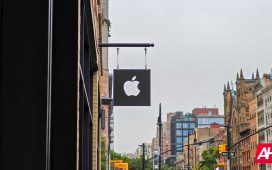President Donald Trump’s tariffs on China went into effect on Wednesday at a rate of 104%, sparking a retaliatory 84% tariff from China on American goods.
The move caused Apple’s market value to plummet by 23% across the past four trading days, erasing over $700 billion and causing Apple to lose its status as the most valuable company in the world to Microsoft.
At the time of writing, Apple was worth $2.59 trillion, while Microsoft was worth $2.635 trillion. Apple shares were down over 28% year-to-date, while Microsoft shares were down about 14%.
Apple depends heavily on China for manufacturing; CNBC notes that about 90% of iPhones are made in China. Morgan Stanley analysts predicted last week that tariffs could cost Apple $34 billion per year, a cost that Apple could pass on to consumers. Apple’s declining value is due to investor concerns that tariffs could cause Apple to raise prices, leading to decreased demand.
The threat of rising iPhone prices caused increased foot traffic to Apple stores over the weekend and into the week. Customers were concerned about possibly higher iPhone prices in the future and were buying phones in a panic, Apple store employees told Bloomberg.
Trump has stated that tariffs would boost the U.S. economy by incentivizing companies to bring jobs and factories back to the U.S.
In a tariff announcement last week, Trump pointed to the “unsustainable” trade deficit, which hit $1.2 trillion last year, and stated that he would impose higher tariffs on countries with the largest trade deficits with the U.S., including China, the European Union, Mexico, Vietnam, and Ireland.
“The President’s reciprocal trade agenda means better-paying American jobs making beautiful American-made cars, appliances, and other goods,” the announcement read.
However, it is unlikely that Apple will start to manufacture iPhones in the U.S. because of the high cost. Wedbush analyst Dan Ives told CNN Business on Monday that it would take Apple $30 billion and three years to bring just one-tenth of its supply chain to the U.S. An iPhone made in the U.S. could cost consumers as much as $3,500, over three times as much as the price of a $1,199 iPhone 16 Pro Max, Apple’s highest-end phone today.
Still, tariffs have other benefits. They create an additional source of revenue for the federal government, with funds sent to the U.S. Treasury Department. Trump claimed on Tuesday at a White House event that the U.S. was making $2 billion per day from tariffs.
The Tax Foundation, a nonprofit organization, released an analysis last week showing that Trump’s tariffs could lead to $2.852 trillion in revenue for the government over the next decade.
However, tariffs are expected to cause higher prices for consumers. A study from the Yale Budget Lab last week projected that the average household would lose $3,800 in purchasing power from tariffs. Matt Schulz, chief consumer finance analyst at LendingTree, told Fox Business earlier this month that prices are “likely to rise” in response to tariffs.
Apple has not commented yet on any tariff-related price increases. According to Bloomberg, the company is currently selling existing inventory that it has already imported to the U.S. and will likely feel the impact of tariffs starting in its fourth quarter in July.









